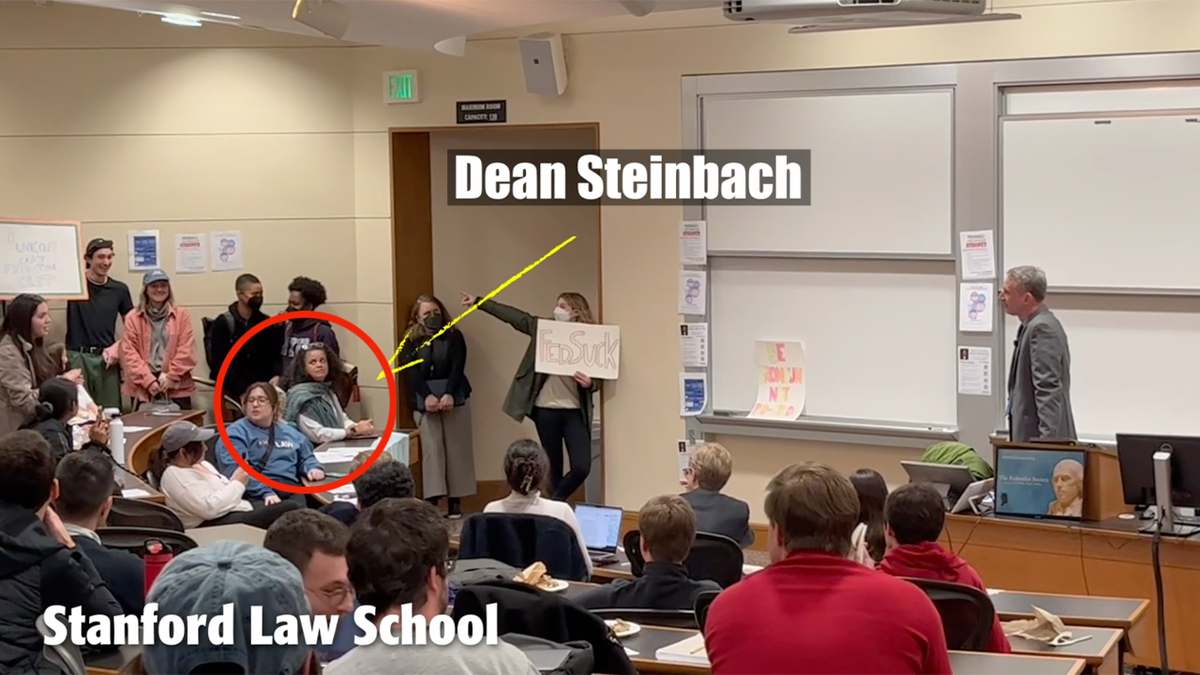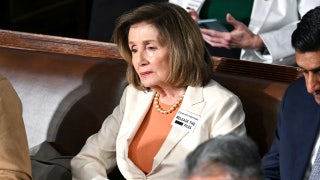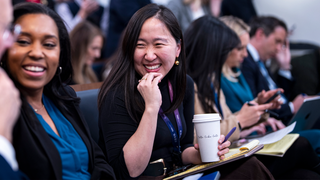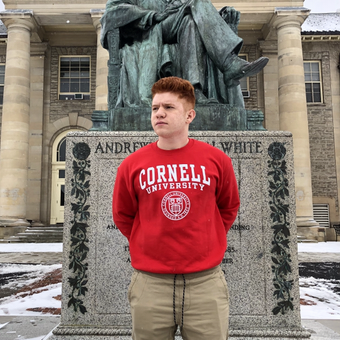Stanford DEI dean looks on as protesters shout down Trump judge
A Trump-appointed federal judge was heckled by protesters at Stanford University while speaking at a Federalist Society event. In this video, the school's associate dean of diversity, equity and inclusion does nothing to stop the protesters.
Last week, students at Stanford Law disrupted a Federalist Society event that featured U.S. Circuit Court Judge Kyle Duncan. Duncan was prevented from speaking by unruly protesters and berated by the school's associate dean of Diversity, Equity, and Inclusion.
Now, some of the protest leaders, many of whom shared the names and pictures of Federalist Society members online and in posters, are unhappy because the Washington Free Beacon published their names.
"NEW: The same students who plastered the names and faces of the Stanford Federalist Society all over the school are now demanding anonymity from the Free Beacon. They say we've violated their right to privacy by identifying them. You can't make it up," Aaron Sibarium, a journalist for the Washington Free Beacon, tweeted Friday.

Tirien Steinbach, the Stanford University Law School associate dean of Diversity, Equity and Inclusion, slams U.S. Circuit Court Judge Kyle Duncan during his presentation at the school as an invited guest on March 9, 2023. (Screenshot/ Vimeo - Ethics and Public Policy Center)
"On Sunday, I identified board members of the Stanford National Lawyers Guild--one of the groups responsible for the posters--who in a public statement described the protest as 'Stanford Law School at its best.' A few hours later, the board demanded I redact their names," Sibarium reported.
Sibarium said that Lily Bou, a board member of the Stanford National Lawyers Guild, sent an email demanding the Free Beacon remove her name and those of other students from their reporting. "Listing our names serves no purpose other than to invite abuse and harassment," she wrote.
"I wonder what purpose the posters of the fedsoc board served," Sibarium wrote.
"You do not have our permission to reference or quote any portion of this email in a future piece," she added.
"Needless to say, that's not how the First Amendment works," Sibarium commented.
NEW VIDEO SHOWS STANFORD PROTESTERS HECKLING FEDERAL JUDGE AS DEI DEAN APPEARS TO SMIRK

Stanford Law's associate dean of diversity, equity and inclusion Tirien Steinbach seen during protest against Judge Kyle Duncan. (FOX NEWS DIGITAL)
He went on, "We've gotten similar complaints about publishing images—pulled from social media—of Stanford Law School dean Jenny Martinez's classroom, which protesters covered end to end in flyers after she issued an apology to Judge Duncan."
"We received a note from Mary Cate Hickman demanding that we ‘anonymize the face of the student in the red hoodie’ because 'California is a two-party consent state, and you have no right to publish this student's identity/likeness/face without consent,'" he tweeted.
The reporter noted that two-party consent only applies to surreptitious audio recordings and that there is no expectation of privacy during a public protest at a public law school event where participants freely post video and images. He also pointed out that the protest has been covered on national television and publications, further eroding any expectation of privacy.
The Free Beacon wrote an editorial about the continuing aftermath of the protests, concluding:
"What's eminently clear from the drama unfolding in Palo Alto is that while Stanford law students may be the vanguard of an anti-constitutional revolution, they don't know much about the law. Where Stanford has failed to educate them in the limits of privacy and the rights of a free press, we will endeavor to fill the void with our continuing coverage of this ugly affair."
CLICK HERE TO GET THE FOX NEWS APP
Free speech is under attack on college campuses across America. At UC Davis on Tuesday, conservative commentator Charlie Kirk's speech was disrupted by protesters who smashed windows and clashed with police.
According to one survey, less than half Republican college students feel safe expressing their political views on campus. Many students fear retribution in personal and professional settings for sharing their conservative beliefs.











































